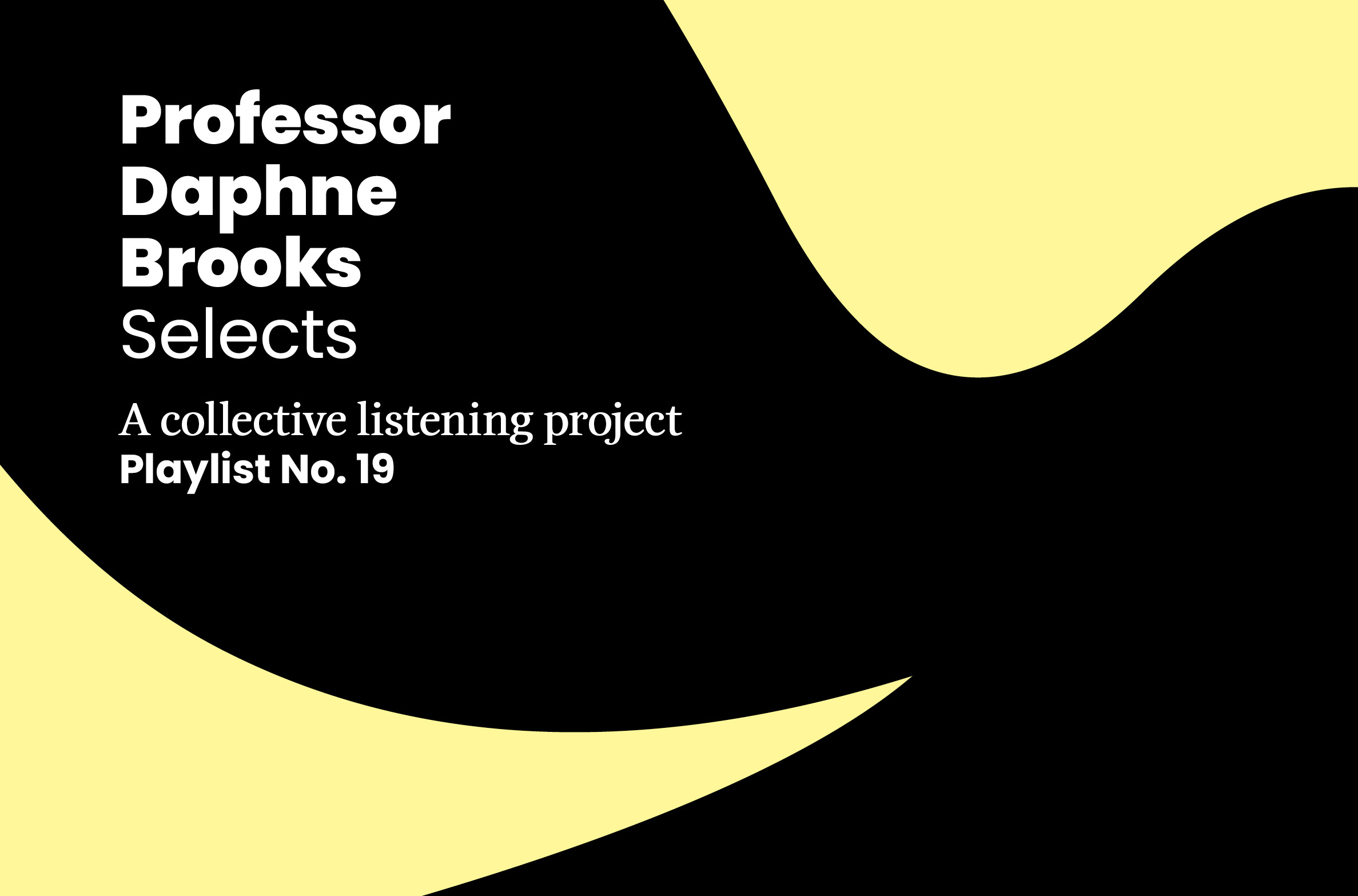Welcome to our 2024-2025 season!
Collective Listening Project
Professor Daphne Brooks Selects
Playlist No. 19
About the Playlist
July 9, 2020

One of our most distinguished scholars of race, gender, and popular music culture, Daphne Brooks serves as Professor of African American Studies and Theater Studies at Yale University and was previously on the faculty at Princeton University. We have enjoyed getting to know her this past year by working on a project together. (More on that soon!) In the meantime, Professor Brooks generously curated this week’s Collective Listening Project playlist which she calls “Freedom Is, Freedom Ain’t: A Short Playlist for July 2020.” Her selections reflect her deep love for and knowledge of black rock music and performance. Taking us through a diverse landscape of artists and genres, Professor Brooks leaves us with Aretha Franklin singing “Never Grow Old,” a song that she beautifully encapsulates as “Bold. Brave. Cathartic. Necessary.”
Pastor T. L. Barrett, Jr. and the Youth for Christ Choir, “Nobody Knows” from the 1971 album, Like A Ship
The mighty Pastor Thomas Lee Barrett, Jr. leads his majestic choir through a dazzling rereading of the classic African American spiritual, “Nobody Knows the Trouble I’ve Seen.” Barrett’s reimagining of this sacred lament leans into a gospel/R&B groove that burrows with stubborn determination and fortitude through the valley of despair and ultimately moves you towards the light of glory sounded out by the incandescent voices in his ensemble. A stirring combination of black struggle and grievance, resilience and revivification all bound up in one riveting performance.
TV on the Radio, “Ambulance” from their 2004 EP, Desperate Youth, Thirsty Babes
Williamsburg’s Afrodiasporic indie rock supergroup goes a cappella and delivers a gorgeous meditation on radical mutual care and intimacy and the urgent beauty involved in catching your lover, your neighbor, your beloved one when they fall. “Lean On Me” for the 21st century and an ethical anthem to live by in the Covid era of peril and catastrophe.
Childish Gambino, “47.48” from the 2020 album, Donald Glover Presents
Can you imagine Prince, Stevie Wonder, Brian Wilson, and a pre-red-hat-wearing Kanye West having a baby with one another? If so, then you can imagine what this astonishing post-soul lullaby by actor Donald Glover’s hip hop alt-ego Childish Gambino sounds like. On this the penultimate track on his Spring 2020 release which dropped at the dawn of the pandemic, he offers a comforting, neo-soul salve for the anxious and angst-ridden. To his toddler child (who makes a wide-eyed, heart-tugging cameo as the song comes to a close), Glover extends words of assurance, hope in darkness: “don’t worry ‘bout tomorrow/The violence, the violence…” A love song to black children facing everyday danger and the parents who hold them so close.
Anderson Paak, “Lockdown,” 2020 single
Afro-Asian multi-instrumental phenom Anderson Paak went to work in mid-June on a song to meet the moment. Measured and contemplative hip-hop soul, Paak’s “Lockdown” documents the on-the-ground, affective state of grassroots activism: exhaustion and weary resolve, quietly buoyant intent, and the core nothing-can-stop-us-now energy of this historic moment in which we find ourselves. “You should’ve been downtown/the people are risin’..” sings Paak, adding that, “[W]e thought it was a lockdown/They opened the fire…” History has its eyes on us, and Paak takes it all in.
Fiona Apple, “Cosmonauts” from her 2020 album, Fetch the Bolt Cutters
The genius Gen-X songwriter Fiona Apple writes epic sonic manifestos about feminist interiority in all its dense complexity and steeped in roiling emotions. One of late denouement tracks on her masterpiece of an album, 2020’s Fetch the Bolt Cutters, “Cosmonauts” is a swirling piece of pop enchantment, the tale of real and sturdy romantics facing cosmic struggles. “How do you suppose that we’ll survive?” Apple asks of her lover before leaning into the certainty that “you and I will be like a couple of cosmonauts/except with way more gravity than we started off…” The anthem to carry us through our times and into a galaxy of possibility.
PJ Harvey, “We Float” from her 2000 album, Stories from the City, Stories from the Sea
At the dawn of the 21st-century, English post-punk warrior PJ Harvey recorded a love letter album to New York City, Stories from the City, Stories from the Sea, a rock and roll feminist flaneur’s take on the emotive volatility of modern life in motion. The exquisite climax to all that maelstrom, “We Float,” her parting message on that album is one of both existential reckoning and ethereal wonder. “We float…,” croon’s Harvey, “take life as it comes…” Twenty years on, she sings the soundtrack to our 2020 quarantine life.
Nina Simone, “I Wish I Knew (How It Would Feel to Be Free)” from her 1963 album, Right Here, Right Now
One of Nina Simone’s most famous songs, “I Wish I Knew (How It Would Feel to Be Free)” encapsulates key tenets of the black radical tradition in liberation music. Always layered and paradoxical, black freedom music, as Frederick Douglass told us all the way back in 1845, is both joyous and filled with turmoil, born out of subjugation and a music of fugitive resistance and transformative potential. It holds all of this in its notes. One of the twentieth century’s greatest forces in sound, Simone channels that history in her reading of Billy Taylor and Dick Dallas’s song which she first released at the height of the Civil Rights revolution. A tale of dreaming and flight and the will to teach oneself how to plot one’s own escape.
Beyoncé, “Black Parade” from the forthcoming 2020 visual album, Black Is King
March with the 21st century’s biggest pop star, a pathbreaking black feminist artist whose embrace of black public culture as restorative energy, insurgency, and renewal is summed up on a track that invokes generations of African American jubilee celebrations, Juneteenth parades, and homecoming block parties. “Black Parade” is the renewal single that dropped in midst of our 2020 protest world and urged the masses on. Beyoncé champions this moment of blackness in all its luminous and embodied dimensions, through its social, economic, and political reverberations, strolling and strutting and claiming the right to assemble. She calls out to us to not fear these streets.
Aretha Franklin, “Never Grow Old” from the 2018 film, Amazing Grace
The Queen of Soul’s greatest performance and arguably one of the greatest musical performances captured on film in the twentieth century, Sidney Pollack’s 1972 Amazing Grace finds Aretha Franklin at the height of her powers as a prodigious vocalist. The film includes her climactic marvel of a reading of the gospel classic, “Never Grow Old.” This is what it means to be wrecked and remade again in song. Bold. Brave. Cathartic. Necessary. The performance that calls upon each of us to become more human.



